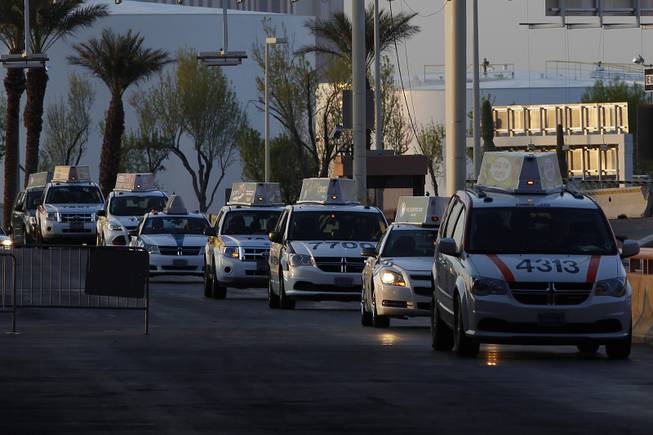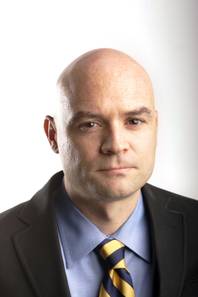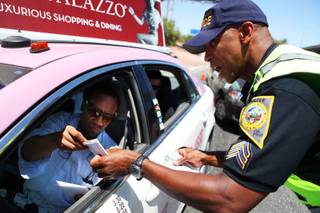
Las Vegas Sun
Taxis are seen queued up at McCarran International Airport on Friday, March 22, 2013.
Published Wednesday, April 24, 2013 | 2 a.m.
Updated Wednesday, May 1, 2013 | 6:30 p.m.
View more of the Sun's opinion section

J. Patrick Coolican
Sun coverage
Welcome to Las Vegas. Now I’m going to steal $10 from you.
That’s the message we’re sending to thousands of tourists every year who get in a cab at McCarran International Airport and are taken to their hotel the long way.
At least when the hotels take the tourists’ money, it’s based on a bet whose odds are well known. But the cabbies are just flat-out stealing, and our political system is so inept that it refuses or is unable to act.
Legislative auditors reviewed 2,730 trip sheets from the airport and found that 614 of them — 22.5 percent — included reports of drivers taking passengers on a longer route than necessary. This amounted to $14.8 million taken from taxi passengers, according to the report released this week.
Yellow Checker Star Transportation disputed the findings of the audit, calling it “wildly reckless and inaccurate.” But plenty of people think the estimates are low, that the problem is even worse than the audit alleges.
Imagine if a gang of thieves had stolen this much money from casinos or ATM machines or 7-Elevens? We’d be all over it.
When it comes to stealing from taxi passengers, however, that sound you hear is the shuffling of feet and the scratching of heads. Hmmm. How do we solve this problem? Hmmm.
As my colleague Rick Velotta reported recently, of 1,594 citations written by Taxicab Authority officers in 2012, only 120 — or 0.0004 percent of the 27 million total taxi rides — were for long-haul violations.
The drivers say the companies tacitly, if not explicitly, encourage the practice. The companies say they try to stop long-hauling but are powerless to do so. Believe who you want, or believe none of them, but pay attention because otherwise you’ll be driving by Red Rock on your way to the Strip.
Aside from the long-hauling, the reality is that the whole game is rigged, a cartel. There are only nine ownership groups that control the 2,200 cabs on the road at any one time, a less-than-free market controlled by the juiced-in Taxicab Authority board. It’s basically like OPEC.
The simplest way to solve the long-haul problem is to adopt a flat rate from the airport to various points on the Strip, just like other cities have done. That way, there’s no temptation to long-haul.
The Taxicab Authority studied this proposal ad nauseum before the industry shut it down. If the companies are so intent on stopping long-hauling, why are they against the flat rate? The question answers itself: Of course they’re not trying to stop long-hauling. Long-hauling puts millions in their pockets every year.
As if to add insult to injury, one company wants to sell the Taxicab Authority software that would detect and prevent long-hauling, like a hacker selling you anti-virus software.
How on earth did the taxi companies get so powerful?
Well, just take a look at the industry’s list of paid lobbyists at the Legislature.
Frias Transportation alone is represented by former Assembly Ways and Means Chairman Morse Arberry, who once pleaded guilty to taking $120,000 in campaign donations and dropping it in his personal account; friend of the governor and superlobbyist Greg Ferraro; former Assembly speaker and Henderson police Chief Richard Perkins; and law and lobbying firm Snell & Wilmer, which also employs two state senators.
Do you ever wonder why you pay a $3 surcharge to use a debit or credit card in a cab? As my former colleague David Schwartz reported, the average Las Vegas cab fare has been about $13.50 in recent years, which means the $3 fee works out to an average 22 percent surcharge. Imagine paying a 22 percent surcharge to use your credit card at the grocery or sporting goods store.
Why do you think we don’t have light rail or some high-quality transit to and from the airport like so many other cities? It will never happen due to the power of the cab lobby.
Our only hope on the long-hauling front is that the hotels raise a ruckus about their customers showing up with 10 fewer dollars to spend on watered-down cocktails.


Join the Discussion:
Check this out for a full explanation of our conversion to the LiveFyre commenting system and instructions on how to sign up for an account.
Full comments policy